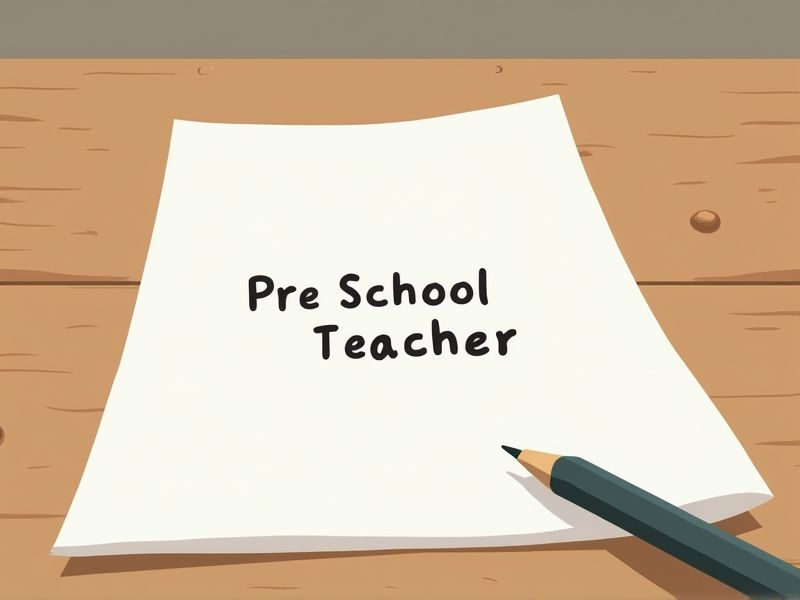
Pre-school teachers play a pivotal role during the formative years of child development, influencing both academic and social skills. Certifications provide assurance that a teacher possesses the necessary skills and knowledge for fostering a safe and effective learning environment. Regulatory bodies often require these credentials to maintain educational standards and ensure child safety. These important certifications might be necessary for someone aspiring to become a pre-school teacher.
Child Development Associate (CDA) Credential
A CDA Credential is essential for preschool teachers because it establishes a standard for knowledge and skills needed to work effectively with young children. This credential improves a teacher's ability to create a safe, nurturing, and educational environment, which directly influences children's developmental outcomes. With the growing emphasis on early childhood education quality, holding a CDA can enhance a teacher's professional credibility and career opportunities. It also ensures alignment with national standards, which can lead to improved classroom practices and outcomes for preschoolers.
Early Childhood Education Certification
Early Childhood Education Certification equips preschool teachers with the latest pedagogical strategies tailored for young learners, ensuring effective instruction. Certified teachers are more likely to understand developmental milestones, enabling them to identify and address learning or behavioral challenges early on. Preschools with certified educators often report higher levels of trust and satisfaction from parents, leading to increased enrollment and reputation. Certification provides a standardized framework that helps maintain quality and consistency across educational environments.
CPR and First Aid Certification
Pre-school teachers frequently encounter situations where young children may accidentally get injured or experience medical emergencies, necessitating CPR and First Aid skills for immediate response. Training ensures teachers increase the likelihood of positive outcomes by stabilizing children until professional medical help arrives. Certification enhances the teacher's ability to recognize and appropriately react to life-threatening situations, aligning with safety and compliance standards set by educational institutions. Parents often feel more confident entrusting their children to educators who are prepared to handle emergencies, thereby improving trust and enrollment in the learning program.
Montessori Certification
Montessori certification equips preschool teachers with specialized skills to effectively engage young learners using the Montessori method. Teachers gain a deeper understanding of child development, fostering a learning environment that supports autonomy and creativity. Certification ensures teachers are well-versed in the use of Montessori materials, which are integral to the method's hands-on learning approach. Parents are more likely to trust and enroll their children in programs where educators possess recognized credentials, enhancing the school's reputation and enrollment numbers.
Special Education Certification
Special education certification equips preschool teachers with the skills to identify and address diverse learning needs, improving educational outcomes for all children. Data shows early intervention can significantly impact a child's developmental trajectory, so having certified teachers is crucial at the preschool level. Teachers with this certification are better prepared to create inclusive classrooms, which fosters social and cognitive benefits for both typical and special-needs children. Certified teachers are often more adept at collaborating with specialists and families, enriching the educational environment.
Behavior Management Certification
Behavior Management Certification equips pre-school teachers with strategies to handle diverse classroom situations, promoting a conducive learning environment. Data indicates that teachers with this certification report higher student engagement and fewer disciplinary issues. Certified teachers possess the skills to address varying behavioral challenges, which fosters emotional development in young children. Schools often see a decrease in staff turnover and an increase in parent satisfaction when teachers are equipped with behavior management skills.
Early Literacy Certification
Early Literacy Certification equips pre-school teachers with specialized skills to foster foundational reading and writing capabilities in young children, as early literacy development has a direct impact on future academic success. Pre-school years are critical for cognitive and language development, and having certified teachers ensures effective instructional strategies are utilized. Certified teachers are trained to identify and address diverse learning needs, reducing potential disparities in educational achievement. Implementing standardized certification ensures consistent quality education standards across different learning environments, enhancing overall educational outcomes.
Health and Safety Certification
Health and Safety Certification ensures pre-school teachers can effectively manage and mitigate potential risks in the classroom, which directly impacts student well-being. Being certified equips teachers with the necessary skills to respond appropriately to emergencies, reducing the severity of incidents. Schools and parents gain confidence in a teacher's ability to maintain a safe learning environment, which strengthens trust and transparency. Teachers with this certification demonstrate commitment to professional readiness and regulatory compliance, benefiting both the institution and the wider community.
Inclusive Classroom Strategies Certification
Inclusive Classroom Strategies Certification equips pre-school teachers with skills to accommodate diverse learning needs, improving educational outcomes for all students. Teachers trained in these strategies can foster an environment where every child feels valued and understood, promoting better social integration. Certification helps in identifying and implementing specific accommodations, reducing learning barriers for children with disabilities. Evidence suggests that inclusive education enhances cognitive and social development for both children with disabilities and their peers.
Developmentally Appropriate Practices Certification
Developmentally Appropriate Practices (DAP) Certification equips pre-school teachers with the necessary skills to tailor educational approaches to suit the varying developmental stages of young children. Teachers with this certification can implement strategies that enhance cognitive, emotional, and physical growth, leading to improved learning outcomes. Without this certification, teachers might struggle to create a nurturing and effective learning environment, potentially hindering a child's early development. By adhering to the principles of DAP, teachers positively impact children's long-term academic and social success.
Summary
When you acquire certifications as a pre-school teacher, you are likely to improve your teaching skills and classroom management. Enhanced qualifications often lead to increased job opportunities and career growth. Parents may perceive you as more credible, bolstering their confidence in the educational environment you provide. Consequently, the quality of early childhood education could see significant improvements due to your advanced expertise.
